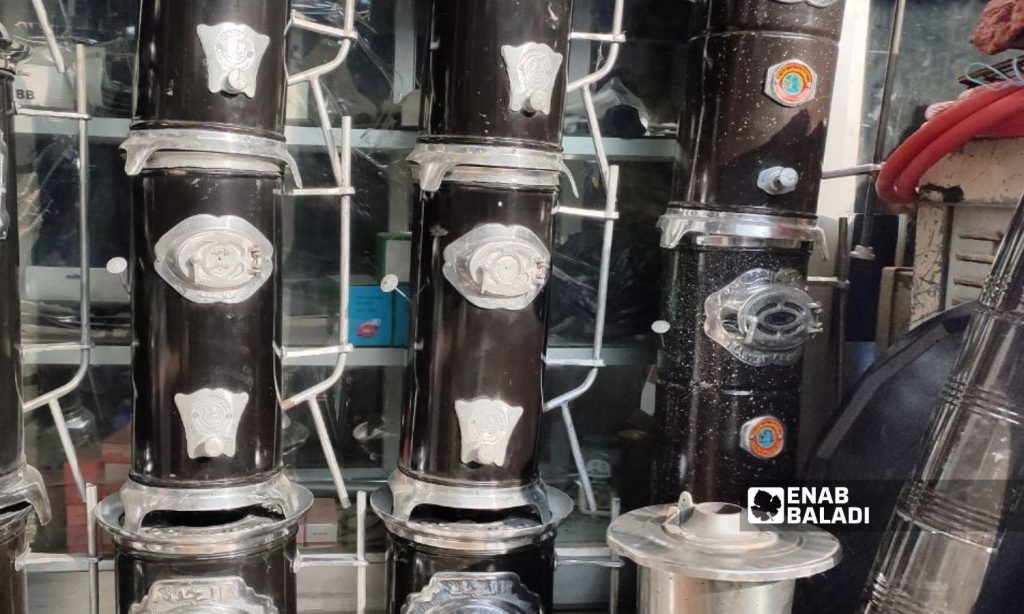Al-Hasakah – Majd al-Salem
The living burdens increased on the shoulders of poor and needy families in al-Hasakah governorate during the current winter, which prompted many of them to buy used heating devices, hoping to protect them from the cold, especially with the high prices of new heaters.
Qamishli-based Riyad al-Hussein, 45, told Enab Baladi that after a “tour” to most of the shops that sell heating equipment, he was “surprised” by the prices for the current winter season.
Most of the shop owners put “paper slips” on heaters, including the price in US dollars, as prices ranged between 30 and 50 USD (180,000 – 300,000 SYP), while a minority sells it in Syrian pounds, according to al-Hussein.
The government employee, with a salary of no more than 15 USD, found that replacing his “old, dilapidated” heater would cost him two consecutive months’ salary, so he decided to maintain and repair the old one and abandon the idea of buying a new one.
Salim al-Safouq, a 31-year-old daily worker from al-Qahtaniya district, went to the used tools market in Qamishli, looking for a used heater at a price that suits his income, which does not exceed 12,000 Syrian pounds per day, and he may not find work all days of the week.
For 50,000 SYP, al-Safouq was able to obtain a fireplace in “good condition that meets the purpose,” as he told Enab Baladi.
Al-Safouq is not the only one who resorts to the used tools market, as many of his colleagues and neighbors found the solution in the “used” ones, saving about 100,000 from the “new price.”
The heating pipes and other accessories were also not spared from the high prices, according to al-Safouq. Enab Baladi monitored the prices, which amounted to 10,000 SYP, while its price last winter was about 3,500 SYP.
Falling pound, taxes behind price soaring
Shop owners justified the increase in the prices of heaters by the continuous deterioration of the value of the Syrian pound against the dollar, which “is not stable and is always on the rise.”
Mounir Amouki, 49, says that he is “forced” with his fellow shop owners to price in dollars to avoid “loss.”
The taxes imposed by the Autonomous Administration of North and East Syria (AANES) and the royalties of the Syrian regime’s checkpoints on incoming goods, most of which come from the regime’s areas in Aleppo and Damascus or from northern Iraq through the Semalka border crossing, increase the price of heaters, according to Amouki.
There are diesel, gas, and electric heaters available in the market. Most of the electric heaters are imported from Turkey through the Semalka border crossing, but they are also very expensive, with an average price of 200,000 Syrian pounds, according to size, quality, and manufacturing destination, Amouki told Enab Baladi.
He added that the demand for electrical heating is weak due to the scarcity of electric current coming from the electricity company lines, while most families’ subscription in private electricity generators is limited to only three amperes which is not sufficient to operate electric heaters.
As for gas heaters, there is also a shortage of gas, and its prices are rising on the black market, as the price of a domestic gas cylinder reached 75,000 Syrian pounds, while the demand for diesel heaters remains “to some extent” good, but it is lower than last year. As a result, “prices have doubled from before,” Amouki said.
Countryside residents resort to wood-burning stoves
In the countryside, where job opportunities and income levels are lower, many families have resorted to wood-burning stoves, according to what Enab Baladi monitored.
Amer Khalil, 42, who lives in the southern countryside of al-Qahtaniya, told Enab Baladi that he resorted to wood heaters as a “practical and cheap” alternative to high-priced diesel heaters, as they are “manufactured locally” on the one hand, and their ignition material, which is wood, can be obtained sometimes for “free” or at a “symbolic” price.
Khalil also uses the dry branches of the cotton plant as fuel after harvesting the crop, he said.
Recently, the AANES raised the prices of a number of basic materials, especially fuel, without an official decision, a move that some residents described as “to avoid popular anger and resentment.” The most recent of these decisions was to raise the price of the domestic gas cylinder from 2,500 to 7,000 SYP last November.











